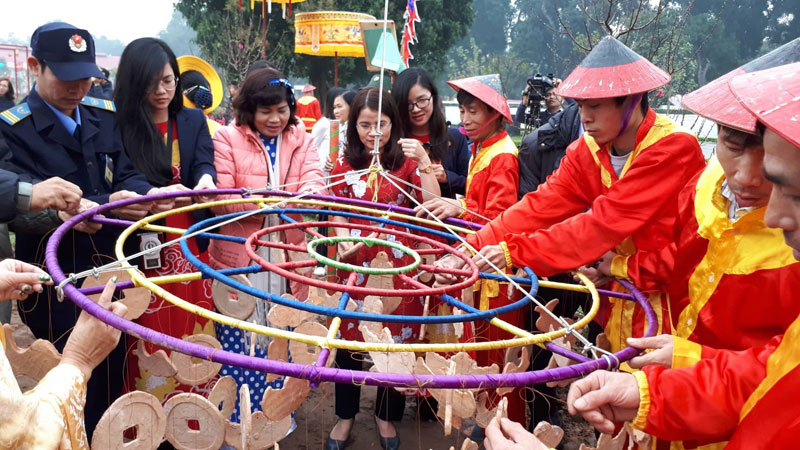



Decorating the Tet bamboo pole (Photo: Hoang Thanh Thang Long).
The activity kicked off a series of events to be held within the premises of the heritage site in order to welcome the year of the pig.
The event was attended by leaders of the Vietnamese Fatherland, the Ministry of Foreign Affairs, the Hanoi government, overseas Vietnamese and residents of the capital city.
The reproduced rituals included an offering to the Kitchen Gods, the release of carp into an ancient river at the archaeological site of 18 Hoang Dieu and the erection of a bamboo pole in front of the Doan Mon Gate.
A Tet bamboo pole is be put up at the imperial citdatel (Photo: Hoang Thanh Thang Long)
A delegation of overseas Vietnamese who will attend the Homeland Spring programme later in the day also offered incense at the imperial citadel.
To welcome the new year, an exhibition was held at 19C Hoang Dieu featuring cultural traditions that remind people of Tet in bygone days, while kids could experience folk games and enjoy exciting water puppetry performances.
According to the organisers, the re-enactment of the traditional rituals will help safeguard the traditional culture within the heritage site.
The Imperial Citadel of Thang Long will close during February 3-5 and reopen on February 6, or the second day of the Lunar New Year.
At the end of May, the Hoa Binh Provincial Ethnic Arts Troupe organized a series of performances for residents in Region 2 and Region 3 communes across the province. Bringing art to ethnic communities in remote, isolated, and especially disadvantaged areas has become a meaningful activity. These are not merely artistic performances but also journeys to disseminate cultural values, enrich spiritual life, and contribute to preserving the cultural identity of ethnic minorities.